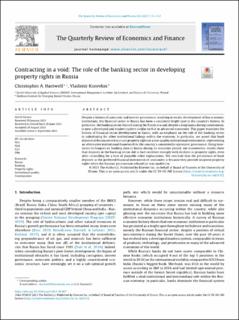Please use this identifier to cite or link to this item:
https://doi.org/10.21256/zhaw-23101| Publication type: | Article in scientific journal |
| Type of review: | Peer review (publication) |
| Title: | Contracting in a void : the role of the banking sector in developing property rights in Russia |
| Authors: | Hartwell, Christopher A. Korovkin, Vladimir |
| et. al: | No |
| DOI: | 10.1016/j.qref.2021.08.007 10.21256/zhaw-23101 |
| Published in: | The Quarterly Review of Economics and Finance |
| Volume(Issue): | 82 |
| Page(s): | 113 |
| Pages to: | 127 |
| Issue Date: | 2021 |
| Publisher / Ed. Institution: | Elsevier |
| ISSN: | 1062-9769 1878-4259 |
| Language: | English |
| Subjects: | Banking; Cointegration; Institutional quality; Property right |
| Subject (DDC): | 332.1: Banks |
| Abstract: | Despite a history of autocratic and uneven governance, resulting in erratic development of key economic institutions, the financial sector in Russia has been a consistent bright spot in the country’s history. In particular, the banking sector thrived during the Tsarist era and, despite a long hiatus during communism, is now a developed and modern system similar to that in advanced economies. This paper examines the history of financial sector development in Russia, with an emphasis on the role of the banking sector in substituting for other institutional failings within the economy. In particular, we assert that bank deposits in Russia served as ersatz property rights in a low-quality institutional environment, representing an alternative institutional framework to the country’s consistently repressive governance. Using time-series techniques on banking data in Russia during its transition period, our econometric results show that deposits in the banking sector did in fact correlate strongly with declines in property rights, even after controlling for a host of plausible other explanations. We conclude that the persistence of bank deposits as the preferred financial instrument of consumers is because they provide incipient property rights when the Russian government refused (or was unable) to. |
| URI: | https://digitalcollection.zhaw.ch/handle/11475/23101 |
| Fulltext version: | Published version |
| License (according to publishing contract): | CC BY-NC-ND 4.0: Attribution - Non commercial - No derivatives 4.0 International |
| Departement: | School of Management and Law |
| Organisational Unit: | International Management Institute (IMI) |
| Appears in collections: | Publikationen School of Management and Law |
Files in This Item:
| File | Description | Size | Format | |
|---|---|---|---|---|
| 2021_Hartwell-Korovkin_Contracting-in-a-void.pdf | 1.43 MB | Adobe PDF |  View/Open |
Show full item record
Hartwell, C. A., & Korovkin, V. (2021). Contracting in a void : the role of the banking sector in developing property rights in Russia. The Quarterly Review of Economics and Finance, 82, 113–127. https://doi.org/10.1016/j.qref.2021.08.007
Hartwell, C.A. and Korovkin, V. (2021) ‘Contracting in a void : the role of the banking sector in developing property rights in Russia’, The Quarterly Review of Economics and Finance, 82, pp. 113–127. Available at: https://doi.org/10.1016/j.qref.2021.08.007.
C. A. Hartwell and V. Korovkin, “Contracting in a void : the role of the banking sector in developing property rights in Russia,” The Quarterly Review of Economics and Finance, vol. 82, pp. 113–127, 2021, doi: 10.1016/j.qref.2021.08.007.
HARTWELL, Christopher A. und Vladimir KOROVKIN, 2021. Contracting in a void : the role of the banking sector in developing property rights in Russia. The Quarterly Review of Economics and Finance. 2021. Bd. 82, S. 113–127. DOI 10.1016/j.qref.2021.08.007
Hartwell, Christopher A., and Vladimir Korovkin. 2021. “Contracting in a Void : The Role of the Banking Sector in Developing Property Rights in Russia.” The Quarterly Review of Economics and Finance 82: 113–27. https://doi.org/10.1016/j.qref.2021.08.007.
Hartwell, Christopher A., and Vladimir Korovkin. “Contracting in a Void : The Role of the Banking Sector in Developing Property Rights in Russia.” The Quarterly Review of Economics and Finance, vol. 82, 2021, pp. 113–27, https://doi.org/10.1016/j.qref.2021.08.007.
Items in DSpace are protected by copyright, with all rights reserved, unless otherwise indicated.